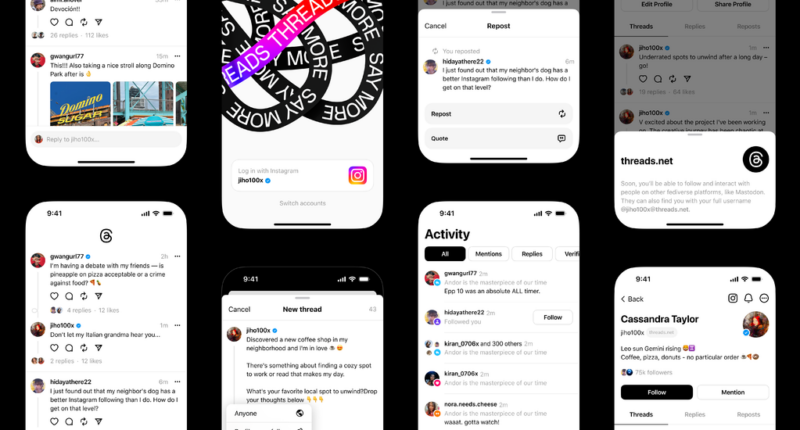
After months of speculation and secrecy, Mark Zuckerberg’s long-rumored competitor app to Twitter is here.
The new app, Threads, was unveiled on Wednesday as a companion to Instagram, the popular photo-sharing network that Mr. Zuckerberg’s company, Meta, bought more than a decade ago. If Instagram executives get their way, Threads will also replace rival Twitter, with some techies referring to it as a “Twitter killer.”
The rollout of Threads ramps up the rivalry between Mr. Zuckerberg and Elon Musk, who bought Twitter last year. Mr. Musk has changed the experience of Twitter by tinkering with its algorithm and other features, and most recently imposed temporary limits on how many tweets people could read when using the app, inciting outrage.
Many tech companies have tried capitalizing on Twitter’s turmoil in recent months. But Threads has a leg up, backed by Meta’s deep pockets and Instagram’s enormous user base of more than two billion monthly active users around the world.
In a post to his Threads account on Wednesday, Mr. Zuckerberg said he wanted the new app to be “friendly as it expands,” which was an area where “Twitter never succeeded” as much as he believed it should have. “We want to do it differently,” he said.
Here’s what to know about Threads.
What is Threads and how does it work?
Built by Instagram, Threads is positioned as an app where people can have real-time, public conversations with one another. Threads also helps boost Instagram, which is a marquee app in Meta’s family of products.
“The idea is to hopefully build an open, friendly space for communities,” Adam Mosseri, head of Instagram, said in an interview.
Instagram has tied Threads closely to itself. Those interested in signing up for the new app are required to have an Instagram account for now. A user’s Instagram handle must also be their Threads user name.
And people will be able to directly import the list of those they follow on Instagram to Threads if they wish. Instagram’s verified users will also be verified on the new app. Users can set their Threads account to be private or public.
How is Threads similar to or different from Twitter?
Threads looks nearly identical to Twitter in many ways. Users can post mostly text-based messages to a scrolling feed, where people who follow them and whom they follow can reply. People can also post photos or video to the app.
But Threads is also different from Twitter. It does not currently support direct messaging, a feature that Twitter offers. Instagram said it may add features to Threads if new users ask for them.
How did Instagram come up with Threads?
Instagram has made a concerted effort to simplify its app over the past few years, Mr. Mosseri said. As part of that effort, he said, Threads was spun out into a separate app. That way, Instagram would not be too cluttered by trying to make public conversations work inside its existing app.
The choice to create a new app was also hard to resist, Mr. Mosseri added, especially at a tumultuous moment in the social media landscape.
“There was an opportunity or demand for more people to play in the public space,” he said, referring to the changes around Twitter under Mr. Musk. Mr. Mosseri added that the chance to challenge Twitter came about “not just because of the ownership, but because of product changes and decisions” that Mr. Musk and others made to how the social platform works.
Instagram began its effort to take on Twitter late last year, with dozens of engineers, product managers and designers pitching ideas on what a rival app could look like. Among the notions Meta’s workers talked over at the time was a more extensive rollout of a feature called Instagram Notes, where people can share short messages on the site, and a text-focused app using Instagram’s technology.
Ultimately, Mr. Mosseri said, he and other managers decided they should “make a bet” in the space and leaned into building what became Threads.
How will Threads work with other apps?
Instagram’s goal is to ultimately have Threads work across multiple apps in what it calls the Fediverse, which is shorthand for a federated universe of services that share communication protocols. Other apps like Mastodon, another social network, also function in this way.
This might sound like a lot of tech speak. What it means, essentially, is that Instagram wants to make it easier for Threads to operate seamlessly with other platforms, which could appeal to creators and influencers so they do not have to start from scratch on each app.
If a creator builds up a sizable number of followers on Threads, for instance, they could ostensibly take those followers with them to other platforms that are built on the same technology. That would make it less risky for creators and could free them from feeling like they are “stuck” on one platform, Mr. Mosseri said.
Has Instagram cloned other apps?
Mr. Zuckerberg’s Meta, which also owns Facebook and WhatsApp, has an extensive history of trying to stamp out social media rivals, partly by copying their features. Mr. Zuckerberg is fiercely competitive and has long wanted to own a product that accomplishes what Twitter does.
That strategy does not always guarantee success. Facebook’s early attempts to clone the ephemeral messaging app Snapchat, for example, did not initially gain much traction.
Even so, Meta has continued to imitate rivals. In 2020, Meta released a TikTok copycat called Reels, which focuses on short videos and has since become widely used.
Where will Threads be available?
Threads is available for download for free from Apple’s App Store and the Google Play store in the United States and roughly 100 other countries beginning on Wednesday. It has plans to expand further.
But Meta said Threads will not initially be available in the European Union, one of the company’s largest markets. A new E.U. law called the Digital Markets Act is taking effect in the coming months and limits how the largest tech companies share data across services. Meta said it was waiting to get more specifics about the law’s implementation before introducing Threads across the 27-nation bloc.
Adam Satariano contributed reporting.
Source: | This article originally belongs to Nytimes.com









